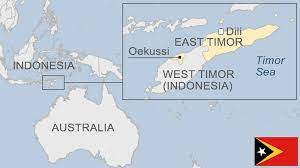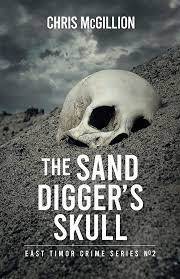The Sand Digger’s Skull (2023) by Chris McGillion.
GoodReads meta-data is 262 pages, rated 5.0 by 2 litizens.
Genre: krimi.
DNA: Timor.
Verdict: Didn’t see that coming.
Tagline: who dun what?

More dirty work in Timor-Leste when labourers shovelling up sand for cement along a river came across human bones, one after another. Geographic, hydrological, and meteorological analyses indicate the bones were carried by the river and deposited in the sand at the spot where they were found. Pathological analysis suggests several died years ago but the death of one is much more recent.
Evidently most crimes in Timor-Leste trace back to the Indonesian invasion and occupation of 2002, so Investigator Codero in Dili gets the assignment to look into the matter as part of his INTERPOL duties with his reluctant Yankee associate, Carter. Together with the office interpreter and dog’s body, they head for the hills from where the remans likely originated.
What follows is immersion into the remote backwaters of the island of Timor with its animist and xenophobic culture, tropical rain, and subsistence living overlain with its recent history. Saturation in these details nearly drowned this reader but it does convey much of the place and people.
It’s a complex plot which I won’t spoil. Suffice it to say little is what it seems to be and guilt is by many hands. Jaded krimi reader though I am, I was blindsided several times. In addition, the author successfully distinguishes a host of characters and brings them together from the dissolute priest to the surly apprentice mechanic, the ever correct Carter, and the naive translator. The hardest of all and the most uncommon to the genre is the child.
Disclosure: The author is a pal.

Ever the teacher assigning further reading, because everything I read these days reminds me of something else. In this case the reference list included:
Ben Anderson, ‘The Idea of Power in Javanese Culture,’ a chapter in his book Culture and Politics in Indonesia (Cornell University Press, 1972), pp 1-70. Power incarnated in the first half of the chapter.
Denis Thompson, ‘Moral Responsibility of Public Officials: The Problem of Many Hands,’ American Political Science Review, 74 (4), pp 905-916. Who did it? All of them and so none of them.
Colin Turnbull, The Forest People. NYC: Simon & Schuster, 1968. One chapter concerns crime and punishment in a Pygmy community.
Miguel Unamuno, ‘Saint Emmanuel the Good Martyr,’ a short story about a priest who has no faith.
At one time or another each was on a syllabus.

